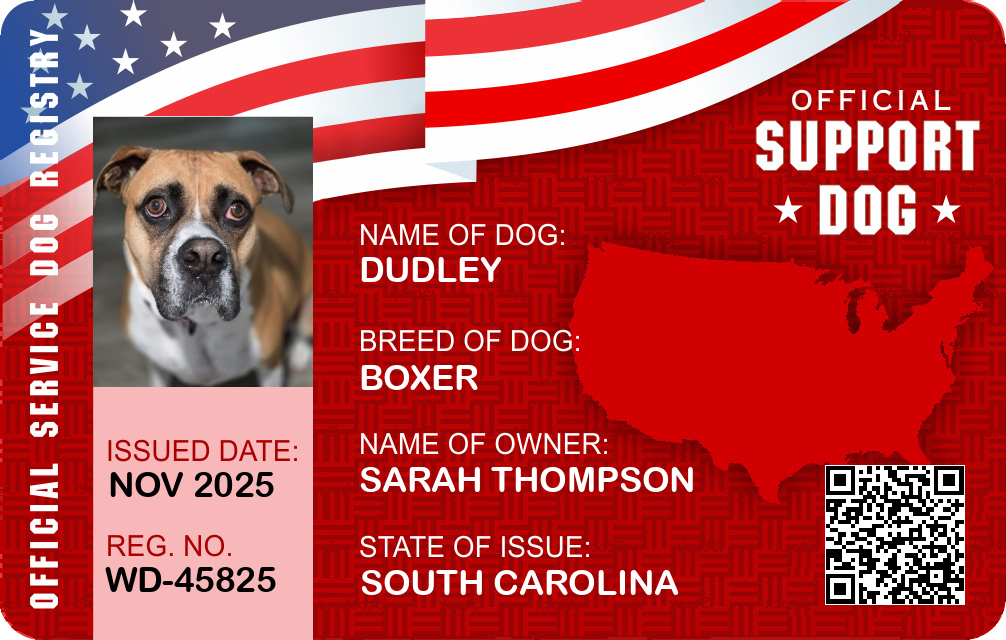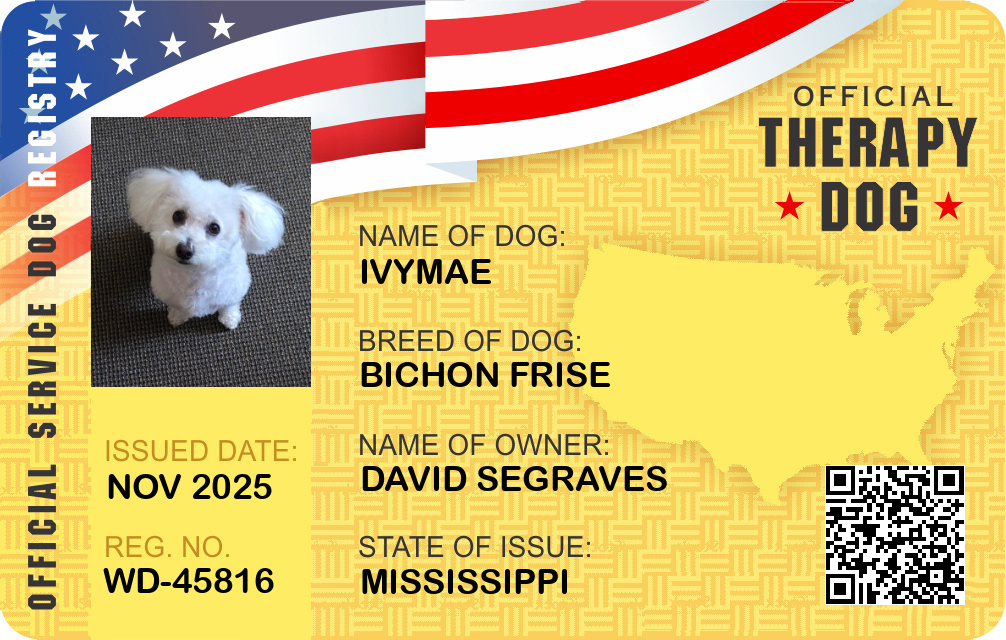Maryland Emotional Support Animal Laws

Overview of ESAs and Legal Definitions in Maryland
What is an Emotional Support Animal?
An Emotional Support Animal (ESA) is a companion animal that provides therapeutic benefits to individuals with a diagnosed mental or emotional disability. ESAs, unlike service animals, do not require specific training to perform tasks. Instead, their primary role is to offer comfort and support through their presence, alleviating symptoms of psychiatric conditions such as anxiety, depression, and PTSD. In Maryland, ESAs are recognized primarily for their supportive role in the context of housing and travel rather than public accommodations.
How ESAs Differ from Service Animals
The main distinction between ESAs and service animals lies in their training and the tasks they perform. Service animals are specifically trained to perform tasks directly related to the individual’s disability, such as guiding a person who is blind or alerting a person with epilepsy of an impending seizure. On the other hand, ESAs do not require specialized training beyond their natural ability to provide comfort. Consequently, ESAs are not granted the same broad public access rights as service animals under the Americans with Disabilities Act (ADA).
Key Federal Laws Affecting ESAs (e.g., FHA, ACAA)
Several federal laws impact the rights and regulations surrounding ESAs. The Fair Housing Act (FHA) is pertinent, as it mandates that housing providers make reasonable accommodations for individuals with disabilities, including the right to keep an ESA in a residence that otherwise restricts pets. The Air Carrier Access Act (ACAA) previously allowed ESAs to accompany their owners in aircraft cabins without additional fees, but the Department of Transportation's 2020 policy change no longer requires airlines to recognize ESAs under the ACAA. While federal laws form the baseline of rights, state-specific regulations, such as those in Maryland, provide additional context and details.
State-Specific ESA Laws in Maryland
Housing Rights and Responsibilities
In Maryland, ESA owners are protected under both federal and state housing laws. Landlords must make reasonable accommodations for tenants with ESAs, allowing them to reside with their emotional support animal, regardless of typical pet restrictions. Tenants must provide a valid ESA letter from a licensed healthcare professional to qualify for this exemption. However, landlords can still deny an ESA if accommodating it would result in undue hardship or fundamentally alter the nature of the housing provision.
Public Access and Accommodation
Unlike service animals, ESAs are not granted unfettered access to public spaces in Maryland. They are primarily recognized within the scope of housing laws, and business owners are not required to allow ESAs in facilities where pets are typically prohibited. However, some businesses may opt to allow ESAs at their discretion. ESA owners should respect and adhere to each facility's rules regarding pet access.
Transportation and Travel Rules
Maryland does not have specific state laws governing the travel of ESAs. Following the 2020 Department of Transportation changes, airlines are no longer mandated to accommodate ESAs; they may treat them as regular pets, subject to pet fees and size restrictions. Owners intending to travel with their ESA should check with individual carriers for specific policies, as some may still offer accommodations on a voluntary basis.
Employment and Workplace Considerations
The workplace accommodation requirements that apply to service animals do not extend to ESAs. In Maryland, employers are not legally required to allow ESAs in the workplace. However, some employers may choose to accommodate ESAs on a case-by-case basis, especially where the presence of the ESA significantly aids the employee's mental health. Employees requesting an ESA accommodation should engage in open dialogue with their employer and provide supporting documentation from a healthcare provider.
Documentation, Requirements, and Processes in Maryland
ESA Letters and Who Can Issue Them
An ESA letter is a critical piece of documentation for individuals seeking ESA accommodations. In Maryland, only licensed mental hea
Register Your Dog Instantly
lth professionals, such as psychologists, psychiatrists, or licensed therapists, can issue these letters. The letter must be current, typically no more than one year old, and specify the necessity of the ESA for the individual’s emotional or psychological well-being.Registration, Certifications, and Common Misconceptions
There is no official registry or certification process for ESAs recognized by federal or Maryland state law. Websites offering ESA certifications or registrations are generally unnecessary and can be misleading. The only documentation required by law is a properly issued ESA letter from a licensed healthcare provider.
Landlord, Business, and Provider Verification Rules
Landlords in Maryland can request verification of an ESA through the presentation of an ESA letter. They are, however, prohibited from asking for specific details about the tenant's disability. Business owners and service providers do not have the legal grounds to demand ESA documentation, as they are not required to allow ESAs into their premises.
Rights, Limitations, and Legal Risks
Rights ESA Owners Have in Maryland
ESA owners in Maryland have the right to reasonable accommodation in housing situations, even where pets are typically not allowed. They are entitled to live with their ESA provided they have an appropriate letter from a healthcare provider supporting their need for the animal.
Limits on ESA Protections and Common Restrictions
Considering their limited scope of protection, ESA owners in Maryland must be aware of the contexts in which these animals are not permitted, such as in most public spaces and businesses. Furthermore, if an ESA displays aggressive behavior or poses a direct threat to others, accommodations may be restricted.
Penalties for Fraud or Misrepresentation
Falsely presenting a pet as an ESA or a service animal is considered fraudulent and can lead to legal penalties. This misrepresentation undermines the legitimacy of service and support animals, potentially resulting in fines or other legal repercussions under Maryland law.
Practical Guidance for ESA Owners in Maryland
How to Qualify for an ESA Legitimately
To qualify for an ESA, individuals must be assessed by a licensed mental health professional and receive a diagnosis of a mental or emotional disability. The healthcare provider can issue an ESA letter if they deem the ESA an integral part of the individual's treatment plan.
How to Talk to Landlords, Airlines, and Employers
When discussing ESA needs with landlords, it is vital to present the ESA letter upfront, clearly explaining the therapeutic necessity of the animal. In the case of airlines, check the carrier's current policies regarding ESAs well in advance of travel. For employment situations, approach discussions with an understanding that workplaces are not obligated to accommodate ESAs and negotiate openly about potential accommodations.
Tips for Avoiding Scams and Legal Problems
- Be wary of online ESA certification services as they are often unnecessary and exploitative.
- Ensure that your ESA letter is issued by a reputable and licensed mental health professional.
- Understand the limitations of ESA access rights to avoid inadvertent legal issues.
- Educate yourself on both federal and state-specific regulations to ensure compliance.
Summary of ESA Laws in Maryland
- ESAs provide emotional support but do not have the same public access as service animals.
- Federal laws like the FHA provide housing rights, but public access is limited.
- Only a licensed mental health professional can issue a valid ESA letter.
- No official ESA registration or certification is required or recognized.
- Fraudulent representation of ESAs as service animals can lead to penalties.
- Open communication and documentation are key when negotiating ESA accommodations in housing and travel.
- Understanding and adherence to the specific rights and limitations of ESA laws in Maryland are crucial for compliance and to avoid disputes.











